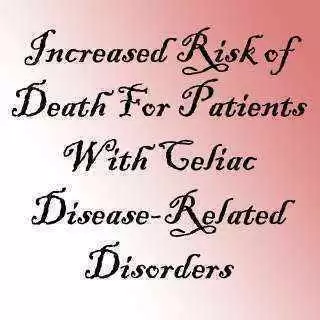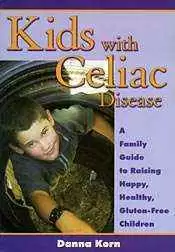
Celiac.com 10/06/2005 - You’ve all heard the joke proclaiming that “denial is not a river in Egypt.” No, it’s not. What it is, though, is a very real issue for many, if not most people who have been diagnosed with celiac disease or gluten sensitivity. There are a couple of types of denial—the first type affects us—while the other type affects those around us.
When We’re in Denial
Many people who are diagnosed—or when their kids are—go through some type of denial. It usually occurs at a few key times after diagnosis—and for a few different reasons, here are some examples:
- Immediate denial—the diagnosis isn’t right. Nope. Couldn’t be. I don’t know anyone who has that. I don’t even know what gluten is. I’ve never heard of celiac disease. I don’t have symptoms…my symptoms are mild. It’s just lactose intolerance, I’m sure. I don’t have diarrhea, so I couldn’t have that. I’m overweight, and all celiacs are skinny. My results were inconclusive. Someone must have made a mistake. All of these thoughts can be symptoms of denial.
- A few weeks into the diet—I don’t think that diagnosis was right. This is when the reality of doing this for the rest of your life sets in. One angel (the good one, of course) sits on one shoulder whispering, “You know you need to stay gluten-free—keep it up—you can do it! Mmmm, yummy cheese on this gluten-free toast. The other shoulder is home to the Devil-in-Denial: “No way are you going to another happy hour and order wine and celery sticks while all the other guys are drinkin’ beer and deep-fried stuff. You don’t have no stinkin’ intolerance. Come on—just one beer...and one piece of pizza. It won’t hurtcha. No stinkin’ intolerance…” This is really just a period of ambivalence, hoping beyond hope that you don’t really have this condition, choosing to lean toward believing you don’t.
- Danger zone: I never had that. The most dangerous type of denial occurs several months into the diet, when all of a sudden you realize you feel so good that you don’t even remember the last time you felt bad. That’s when people often think, “I knew I just needed a little bit of time to get over that bug I had! I feel great. I’ll bet I never even had anything wrong with me.”
Celiac.com Sponsor (A12):
When Others are in Denial
Then there’s the type of denial that our family members and loved ones express. Ask anyone who is gluten intolerant or has been diagnosed with celiac disease if they have relatives who won’t be tested, and chances are, you’ll get a surprised look as though you just guessed what color of underwear they’re wearing, and a “yeah, how did you know?” Because we all have them. Well, most of us do. Why is it so hard for our relatives to believe they might have this? It is, after all, one of the most common genetic diseases one can have—and it does run in the family. Yet we’ve all heard comments like:
- No, I don’t have that (blunt, bold, and full-on denial).
- I don’t think I need to be tested (oh, really, and that would be because….?!?)
- I was tested once, and the tests were negative (remember, once-negative does not mean always negative—also remember there are false negatives).
- I was tested, and my results were inconclusive, so I don’t think I have it (inconclusive may be a euphemism for mildly positive).
- I don’t have any symptoms (oh, really? There are about 250 symptoms, and you have NONE?)
- My symptoms really aren’t that severe; I can live with them (so you’ll just wait till you’re really sick and doing long-term damage to start trying to improve your health?).
- I couldn’t do the diet anyway, so I’m not going to bother being tested (now there’s a rational argument for you).
Bottom line is they don’t want to have celiac disease, or they don’t want to give up gluten. Some of your relatives may even refuse to believe you have it. I’ve met many people with celiac disease who have been accused of being hypochondriacs or neurotic.
The problem with denial is that it justifies eating gluten. When you have this epiphany “realizing” that you don’t have celiac disease or don’t need to be gluten-free, it’s tempting to run, not walk, to the nearest Krispy Kreme outlet.
Resist the temptation. If you’ve been on the diet for awhile, then yes, you feel great, but it’s because you’re not eating wheat or gluten, not in spite of it. The danger in testing the waters is that you may not have any reaction when you do, and then you’re likely to jump to the obvious (by which I mean “desired”) conclusion and confirmation that you never needed to eliminate wheat or gluten in the first place.
If you still wonder whether or not you have a medical reason for cutting gluten from your diet, here are a few things you can do to help solidify things in your mind:
- Get properly tested.
- Get a second (or third) opinion.
- Talk to other people who have been diagnosed with the same condition about your symptoms and your feelings of denial (chances are they’ll grin and say, “Yep, I felt that way at one point, too”).
- Write it down: List your symptoms, the symptoms of the condition, and how you feel if you’ve been following the diet. Sometimes seeing it in writing is the just the proof you need.
Denial, by the way, is one of the most compelling arguments in support of proper testing and diagnosis. If you’ve been confirmed with a diagnosis, you may be tempted to fall into a state of denial, but it’s going to seem pretty silly, even to you.
But also keep in mind that if you’ve been tested and your results were inconclusive or negative, you may need to consider re-testing or other alternatives. The tests have changed over the years, and maybe your tests were done long ago. There are also false negatives; and you can be triggered at any point in your life, so just because you were negative once doesn’t mean you’ll be negative again. And finally, there are people who are negative on all of the tests, yet their health improves dramatically on a gluten-free diet. Go figure.
Remember, if it looks like a duck, walks like a duck, and quacks like a duck, it’s most likely a duck, even if you wish it were a pigeon.





Recommended Comments